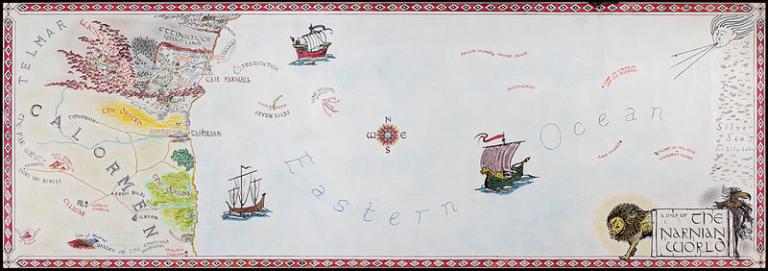
“Leader Of Trump Cabinet Bible Study: God Only Hears Prayers Of ‘Righteous’ Christians”
This reminds me of an Islamic story told about the patriarch Abraham:
It is said that Abraham liked to invite guests to his tent. He was good to travellers. He would take them into his tent and give them food to eat and a place in which to sleep. This attribute of his is even described in the Qur’an, and hospitality remains a cardinal virtue among the Bedouin in particular and the Arabs in general. Still today, a very common greeting — which functions rather like “Hello!” — is ahlan wa sahlan. Literally, it suggests to someone newly arrived that he or she has come to kinfolk (ahl) and to a level camping ground (sahl).
Anyway, every morning Abraham would stand by the main road near his dwelling place and wait for travellers to pass. As soon he saw them, he would invite them to his tent to be his guests. Thus, he would bring home at least one guest every day. And if, by chance, he came across no traveller even for a day, he would be quite unhappy. Without having a guest, he vowed, he would not touch food himself.
Once, it so happened that no traveller passed that way for three days running. Naturally, this disappointed and saddened Abraham. Each morning, he would go hopefully to the main road, straining his eyes, looking far away to the horizon. Yet, for three days, no traveller was to be seen. And, each evening, he would return to his tent disappointed.
Finally, on the fourth morning, an old man appeared, riding on a camel. Delighted, Abraham invited the old man to his tent to eat with him, and the old man accepted.
Once within the tent, they sat down to eat. Before he took his food, Abraham prayed. (In this Islamized story, he said Bismillah, or “in the name of God.”) The old man, however, said nothing. Abraham asked why he didn’t remember God before taking his meal. Is God not our Creator, our Nourisher, and our Master? Is it not proper to remember him before partaking of the food that he’s provided to us?
The old man replied that such prayers weren’t customary in his religion. So Abraham asked him what his religion was. He answered that he was a fire-worshiper — or, in other words, a Mazdean or Zoroastrian.
Irritated at the old man’s answer, Abraham turned him out of his tent.
Immediately, though, the angel Gabriel appeared to Abraham.
God, the angel said, had been feeding this unbeliever for seventy years. Could Abraham not tolerate him for even one meal?
Stung by the rebuke, Abraham ran out of his tent in pursuit of the old man. When he caught up with him, he invited the old man to return to his tent so that they could eat together.
(For Hugh Nibley’s response to a closely related Jewish story, see the very end of the film Faith of an Observer, starting at just about precisely the fifty-minute mark.)
I’ll state my view very clearly on the question of whether God hears the prayers of sincere non-Christians: Every man, woman, and child on Earth is a child of God, and he loves all of them. He will not reject as worthless the heartfelt, sincere prayer of any of those children and, to me, the claim that he would cast them aside is a horrible blasphemy.
I very much admire the story of the young warrior Emeth in The Last Battle, the final book in C. S. Lewis’s wonderful “Chronicles of Narnia.” A Calormene, Emeth has worshiped the evil god of the Calormenes all of his life. But he has done so out of goodness, genuine devotion, and innocent false understanding. And then he finds himself before Aslan, the leonine true God served by the Narnians:
“Then I fell at his feet and thought, Surely this is the hour of death, for the Lion (who is worthy of all honour) will know that I have served Tash all my days and not him. Nevertheless, it is better to see the Lion and die than to be Tisroc of the world and live and not to have seen him. But the Glorious One bent down his golden head and touched my forehead with his tongue and said, Son, thou art welcome. But I said, Alas Lord, I am no son of thine but the servant of Tash. He answered, Child, all the service thou hast done to Tash, I account as service done to me. Then by reasons of my great desire for wisdom and understanding, I overcame my fear and questioned the Glorious One and said, Lord, is it then true, as the Ape said, that thou and Tash are one? The Lion growled so that the earth shook (but his wrath was not against me) and said, It is false. Not because he and I are one, but because we are opposites, I take to me the services which thou hast done to him. For I and he are of such different kinds that no service which is vile can be done to me, and none which is not vile can be done to him. Therefore if any man swear by Tash and keep his oath for the oath’s sake, it is by me that he has truly sworn, though he know it not, and it is I who reward him. And if any man do a cruelty in my name, then, though he says the name Aslan, it is Tash whom he serves and by Tash his deed is accepted. Dost thou understand, Child? I said, Lord, though knowest how much I understand. But I said also (for the truth constrained me), Yet I have been seeking Tash all my days. Beloved, said the Glorious One, unless thy desire had been for me thou wouldst not have sought so long and so truly. For all find what they truly seek.”
(See my commentary on this story, here.)











